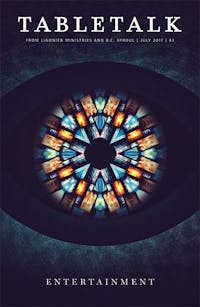
Request your free, three-month trial to Tabletalk magazine. You’ll receive the print issue monthly and gain immediate digital access to decades of archives. This trial is risk-free. No credit card required.
Try Tabletalk NowAlready receive Tabletalk magazine every month?
Verify your email address to gain unlimited access.
Countless books have been written to raise warnings about the evils that surround us in our entertainment-driven culture. The French sociologist Jacques Ellul made the following observation about one danger that accompanies film and television: “People go to the movies to escape and consequently yield to its pressures. They find forgetfulness, and in forgetfulness the honeyed freedom they do not find in their work or at home. They live on the screen a life they will never live in fact” (The Technological Society). It does us well to heed such a warning. Nevertheless, it does us equally well to understand that God has given us numerous forms of entertainment by which we may glorify and enjoy Him.
A proper use of entertainment certainly involves analyzing worldviews, appreciating elements of beauty and creativity, and acknowledging reflections of truth. It also involves understanding that entertainment is part of the rest that God intends for us to enjoy from our labors. Incorporating an appropriate amount of lawful entertainment into our rest means doing so in accord with Scripture in order to bring glory to God. While the Bible does not give us a great deal of explicit statements about how believers are to view entertainment, there is much we can draw out of Scripture by way of good and necessary consequence.
Before considering the biblical teaching concerning the gift of entertainment, it is imperative that we establish a working definition upon which we may agree. We may define entertainment as “an activity that affords pleasure, diversion, or amusement, especially a performance of some kind.” The word entertainment is a derivative of a Latin root that carries the idea of “holding together.” Lawful entertainment is meant to support an individual by giving him joy and pleasure from a performance of some sort.
To the idea of support we must pair the idea of rest. Rest is a vital component of our creatureliness. Ceasing from work in order to rest helps hold us together. Societal preoccupation with entertainment is an indicator that men and women are seeking rest from the burden of their work. Though an excessive use of entertainment is idolatrous (just as excessive work is idolatrous), entertainment serves the purpose of alleviating our minds and bodies from the burden of ongoing labor in this fallen world. It is a gift of God’s common grace to fallen sinners. The single most important principle to remember when we approach this subject is that which the Apostle Paul sets out in 1 Corinthians 10:31: “Whether you eat or drink, or whatever you do, do all to the glory of God.” If we cannot engage in an entertaining activity in such a way as to glorify God, then it is unlawful; and, by way of contrast, if we can, then we are justified in viewing it as a gift of God’s common grace.
This, of course, raises the question, “Does Scripture have anything to say specifically about the gift of entertainment?” In a letter concerning the relationship between Christianity and culture, C.S. Lewis gave what he understood to be biblical rationale for the enjoyment of entertainment:
I found some [biblical] passages that could be interpreted in a sense more favorable to culture. . . . The Talents in the parable might conceivably include “talents” in the modern sense of the word. . . . The miracle at Cana of Galilee by sanctifying an innocent, sensuous pleasure could be taken to sanctify at least a recreational use of culture—mere “entertainment”; and, that aesthetic enjoyment of nature was certainly hallowed by our Lord’s praise of lilies.
Regardless of whether one is convinced by the passages to which Lewis appealed, Scripture lends ample support to a number of forms of entertainment. The role that music, dance, art, sports, and literature play in our quest for joy and rest are found in the details about the lives of David and Solomon as well as in Apostolic illustrations drawn from the athletic, artistic, and literary worlds.
Martin Luther famously said, “Musical performance is principal among the entertainment that God has graciously given us to enjoy in this life.” This is evident from a consideration of the life of David and Solomon. In his dying words, David referred to himself as “the sweet psalmist of Israel” (2 Sam. 23:1). Without doubt, while David was in the field tending his flock as a boy, he was composing songs on his harp and lyre—perhaps even some of the great songs of Scripture (for example, consider Ps. 23). When a distressing spirit came upon King Saul, the king’s servants summoned David to play soothing melodies for the king (1 Sam. 16:16). When God’s blessing rested on David’s musical performance, the distressing spirit departed from Saul (v. 23). When David fled from Saul and lived among the Philistines in Gath (chap. 27), he listened to and learned the music of the Philistines. The title of Psalm 8 indicates that he commissioned the instruments of Gath to be used in Israel. The gift of music is further disclosed when Scripture says, “God gave Solomon wisdom and exceedingly great understanding . . . [so that] his songs were one thousand and five” (1 Kings 4:32). Coupled to the gift of music is the gift of dance. After David returned to Israel with the ark of the covenant, he “danced before the Lord with all his might” (2 Sam. 6:14). Additionally, Scripture alludes to the blessing of dancing in the wisdom literature of Solomon. In Ecclesiastes 3:4, we read, “There is . . . a time to weep, and a time to laugh; a time to mourn, and a time to dance.”
When we turn to the New Testament, we find biblical support for the legitimacy of athletic performance. In illustrating the Christian life, the New Testament writers appealed to running (Heb. 12:1), boxing (1 Cor. 9:26), wrestling (Eph. 6:12), and chariot races. They admired the competitiveness (1 Cor. 9:24), training (v. 25; 1 Tim. 4:7–8), single-mindedness (1 Cor. 9:26), self-denial (v. 27), attire (Heb. 12:1), perseverance (Heb. 12:2), and endurance (1 Tim. 4:8) of athletes. In so doing, they placed value on athletic performance, though less of a value than the quest for godliness (1 Tim. 4:8).
The Scriptural teaching about artwork is equally important. God equipped and employed skillful artisans in the construction of the tabernacle (Ex. 35:1–5, 35) and temple (1 Kings 6:4). Additionally, Jeremiah and Paul utilized the illustration of the potter and the clay (Jer. 18:1–19:11; Rom. 9:21) to highlight God’s sovereignty in the salvation and damnation of sinners. The beauty and creativity of artwork is a reflection of the beauty and creativity of God Himself. From this, we see that artistic media belong to the highest order of cultural entertainment.

In addition to music, dance, and artwork, God has given us a diversity of literary genres to reveal Christ to us—genres familiar to the human authors He chose to superintend in the composition of His Word. The Apostolic employment of extrabiblical poetry (Acts 17:28), philosophy (1 Cor. 15:33), and fictional/apocalyptic narrative (Jude 1:9, 14) in the writing of God’s Word teaches us by implication that literature has an important role to play in our lives. Lewis explained that there is a proper sense in which we are to view literature as entertainment. He wrote:
For a great deal (not all) of our literature was made to be read lightly, for entertainment. If we do not read it, in a sense, “for fun” . . . we are not using it as it was meant to be used, and all our criticism of it will be pure illusion. For you cannot judge any artifact except by using it as it was intended.
When we turn our attention to film and television, we are dealing with an amalgamation of artwork and literature. I love to read nonfiction, but I love to watch fiction. I find it immensely more restful to watch a well-scripted, fictional narrative than I do to read the same in print form. Whatever one’s preference, we must conclude that cinematography is also one of God’s good gifts of entertainment.
Our God has given us a vast array of entertainment by which we may experience joy and rest. While it is possible for us to engage in an immoral or idolatrous use of entertainment, we must not dismiss the fact that entertainment in itself is not sinful. Christ has died to forgive us of the guilt of our sinful use of entertainment and to empower us to enjoy it to the glory of God. As Lewis has aptly noted, “Men must glorify God by doing to His glory something which is not per se an act of glorifying but which becomes so by being offered.”
